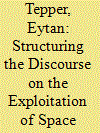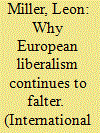|
|
|
Sort Order |
|
|
|
Items / Page
|
|
|
|
|
|
|
| Srl | Item |
| 1 |
ID:
169340


|
|
|
|
|
| Summary/Abstract |
A critical discussion is reemerging in space policy, economics, and law: on the classification, use and possible ownership of space resources, and the governance of these activities in terms of rules and institutions. The US legislation from 2015, recognizing the right of US citizens to all asteroid resources they obtain, clearly signals that “money time” has come, in every meaning. Planetary Resources, Inc. has declared this new legislation “the single greatest recognition of property rights in history”. Yet, the discourse on space resources, which are widely—but not necessarily duly—regarded as “commons”, is unstructured and crippled by the confusion of the notion and essence of “commons” between the economic and the legal meanings. This article provides a critical analysis of the “commons” feature of outer space and outer space resources, based on economic analysis and legal theory. More importantly, this article seeks to provide the structure for this important discourse. The first critical step is to distinguish between (i) commons as an economic term and (ii) commons as a legal regime. The first refers to a type of goods or resource used by multiple users, and the second refers to a property rights regime, the ownership over the resource. A mistake, often made, is the confusion between the economic notion of “commons” and the legal sense of the same concept. An “economic commons”, such as a lake, may have different property rights regimes as it may be private property, government property, or “legal commons”. The second critical differentiation is between the different parts of space (e.g. orbits, celestial bodies, and void space) because some may be “commons” (economic and/or legal) while others may not. Asking whether “space” is commons wrongly puts numerous things in a single basket is a sweeping generalization and, in the economic sense, utterly meaningless. Another important distinction is between resource systems and resource units. If we get the questions wrong, i.e. by confusing the terms and mixing different subjects of inquiry, we will not, by definition, find the right answers. Furthermore, the article demonstrates that the notion of “global commons”, often applied to outer space, is of limited or unclear meaning, and it does not imply the property rights regimes in the domains and resources it presumably describes, including outer space. The article opens with making the aforementioned three distinctions in section two. Sections three and five present, separately, the economic and legal notions of “commons” and examine whether some parts of space qualify as economic and/or legal commons, whereas section four presents the limitations of the notion of “global commons”, thus leading to section five. The article concludes by connecting the economic and legal discussions to the search for appropriate governance models for each part of space. As the article demonstrates, the real questions in the discourse are much more complex than “is space commons?”. Although this article provides preliminary answers to the questions it raises, its main contribution is the reshaping of the question(s) currently being asked and the structuring of the discourse on space resources and their governance.
|
|
|
|
|
|
|
|
|
|
|
|
|
|
|
|
| 2 |
ID:
131016


|
|
|
|
|
| Publication |
2014.
|
| Summary/Abstract |
With tl1e failed attempt to institute Liberalism in the aftermath of WWI it seemed the idealistic vision of perpetual peace, increased prosperity, and collective security was merely an unrealistic hope. However, the successful progression of the European Union from the European Coal and Steel Community and the European Economic Community began a new era of interstate relations. But, the repeated refusal of states to ratify the European constitution is a sign that European economic and policy integration is not enough to give Europeans a sense of shared values and principles and a sense of common heritage. The dissatisfaction over Europe's recent ?nancial woes--that were described as threatening a break-up of EU-has indicated that European Liberalism is faltering again. This article analyzes the issue from the perspective of peace research, global political economy, social psychology, and intercultural relations.
|
|
|
|
|
|
|
|
|
|
|
|
|
|
|
|
|
|
|
|
|